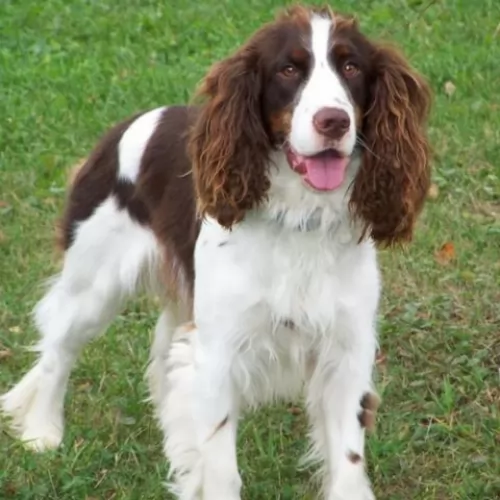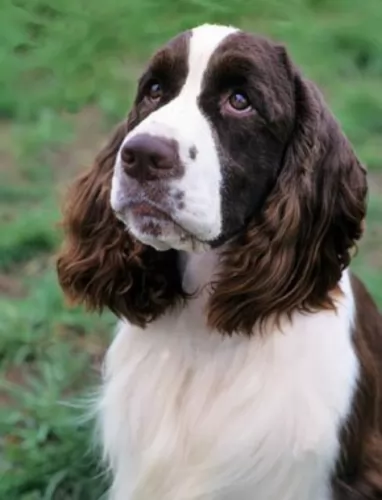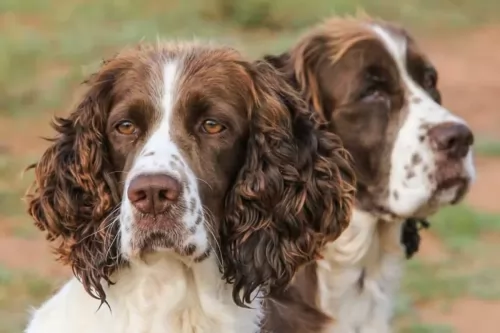 Petzlover
Petzlover English Springer Spaniel is originated from United Kingdom but Indian Spitz is originated from India. English Springer Spaniel may grow 26 cm / 11 inches higher than Indian Spitz. English Springer Spaniel may weigh 18 kg / 40 pounds more than Indian Spitz. Both English Springer Spaniel and Indian Spitz has same life span. English Springer Spaniel may have more litter size than Indian Spitz. English Springer Spaniel requires Low Maintenance. But Indian Spitz requires Moderate Maintenance
English Springer Spaniel is originated from United Kingdom but Indian Spitz is originated from India. English Springer Spaniel may grow 26 cm / 11 inches higher than Indian Spitz. English Springer Spaniel may weigh 18 kg / 40 pounds more than Indian Spitz. Both English Springer Spaniel and Indian Spitz has same life span. English Springer Spaniel may have more litter size than Indian Spitz. English Springer Spaniel requires Low Maintenance. But Indian Spitz requires Moderate Maintenance
 The English Springer Spaniel is one of many gun dog breeds that flush and retrieve. They descended from the Shropshire Spaniels and Norfolk Spaniels. The English Springer Spaniel is somewhat similar to the Welsh Springer Spaniel and believe it or not they are also closely related to the English Cocker Spaniel. In the last century the cockers and springers came from the same parents. The larger dogs flushed game and made game “spring” from the brush while the smaller dogs – the “cockers” would hunt woodcock. Eventually through specific breeding, the UKC of England recognized the “springers” as a separate breed.
The English Springer Spaniel is one of many gun dog breeds that flush and retrieve. They descended from the Shropshire Spaniels and Norfolk Spaniels. The English Springer Spaniel is somewhat similar to the Welsh Springer Spaniel and believe it or not they are also closely related to the English Cocker Spaniel. In the last century the cockers and springers came from the same parents. The larger dogs flushed game and made game “spring” from the brush while the smaller dogs – the “cockers” would hunt woodcock. Eventually through specific breeding, the UKC of England recognized the “springers” as a separate breed.
Sydenham Edwards, in 1801, proposed that the spaniels be divided into the Springing or Hawking Spaniel and the Cocking or Cocker Spaniel. From this point on there was a flourish in the development of spaniel breeds in the 19th century. They were usually named for the county in which they were founded or after the individual who developed them. In 1902, the English Springer Spaniel was officially recognized as its own breed by the UKC. It was not until 1910 that the AKC recognized them as well.
 The Indian Spitz is a working dog and has always been used for hunting and tracking small game. It is a popular dog breed in India.
The Indian Spitz is a working dog and has always been used for hunting and tracking small game. It is a popular dog breed in India.
There isn't too much information on the exact origin of the dog but dog experts tell us the dogs have descended from different Spitz breeds and wild wolves, and that they date back thousands of years.
People often mix them up with the Pomeranian, but they're different, being introduced in India by the British. The British began breeding them from a stock of German Spitz's and years of breeding produced the ideal dog type which could cope with the tempestuous weather conditions in India.
They aren't recognized by any major kennel clubs but the Kennel Club of India is working to establish the Indian Spitz as a separate breed.
 Among spaniels the English Springer is medium size and well compacted. Both the working dog and the show dog sport moderately long coats and a friendly tail. They both wear a gentle expression in their eyes. But there the commonality stops as the difference between the working English Springer Spaniel and the show line is greater in this breed than in any other. The gene pools have become almost separate over the last 70 years. If you put a field dog in the show ring they would not be able to compete. If you put a show line English Springer in the field, they would not have the stamina or speed for field trials.
Among spaniels the English Springer is medium size and well compacted. Both the working dog and the show dog sport moderately long coats and a friendly tail. They both wear a gentle expression in their eyes. But there the commonality stops as the difference between the working English Springer Spaniel and the show line is greater in this breed than in any other. The gene pools have become almost separate over the last 70 years. If you put a field dog in the show ring they would not be able to compete. If you put a show line English Springer in the field, they would not have the stamina or speed for field trials.
The field line has a coarser coat and less pendulous ears. They may dock a few inches off the tail, and they are much scruffier than the show dogs. On the other hand, the show dogs have dewlaps, pendant ears and dangling flews. They are heavier and thicker than the field dog. They have long muzzles, not so prominent eyes and docked tails. The English Springer Spaniel stands tall and proud, coming from an ancient line of Spaniels
 The Indian Spitz is an attractive, fluffy looking dog breed thought to have been domesticated thousands of years ago.
The Indian Spitz is an attractive, fluffy looking dog breed thought to have been domesticated thousands of years ago.
The dog comes in two sizes – the smaller- and larger size. The Smaller Indian Spitz stands at between 20 - 25 cm and weighs between 5 – 7kg while the Greater Indian Spitz stands at 35-45cm and weighs between 12 – 20kg.
The dog has a long-haired coat, with the hair on the head being shorter than the rest of the body. The color of the coat can be white, brown or black and white.
The Indian Spitz is an easy-going dog which adapts to all kinds of living conditions in India. They therefore adapt easily to life in the city or in the countryside.
The Indian Spitz is a social, friendly dog who is loyal towards his human family, showing his joy at being with them with high-pitched barking. He gets on well with children in the home and because he isn't aggressive, he gets on well with pets in the home too.
He is intelligent which means that he is able to be trained and socialized, turning him into an obedient pet who takes his job as guardian and protector seriously.
 The English Springer Spaniel is a friendly dog who loves to please his people. They are great family dogs, easy-going and affectionate. In addition, they are attentive and alert which makes them such great hunting dogs. With exceptional speed and stamina, he needs activity to stimulate his body and brain. He is very intelligent. That intelligence can lead to stubbornness as well. He’d great with kids and good with other pets with perhaps the exception of cats. The breed is in love with water and will get in at any time.
The English Springer Spaniel is a friendly dog who loves to please his people. They are great family dogs, easy-going and affectionate. In addition, they are attentive and alert which makes them such great hunting dogs. With exceptional speed and stamina, he needs activity to stimulate his body and brain. He is very intelligent. That intelligence can lead to stubbornness as well. He’d great with kids and good with other pets with perhaps the exception of cats. The breed is in love with water and will get in at any time.
 Playful, feisty, intelligent, loving and loyal, the Indian Spitz is full of character and just loves being in a loving family home.
Playful, feisty, intelligent, loving and loyal, the Indian Spitz is full of character and just loves being in a loving family home.
Easy to train, he becomes a wonderfully obedient canine friend who loves nothing more than to spend time with you, especially when it is outdoors going for a walk or playing ball.
He is an entertaining little dog too, and anyone wishing to buy a dog like this won't regret it as he brings in a joyful dimension to any home.
 Not an uncommon issue for most medium to smaller sized dogs. It can lead to lameness or arthritis.
Not an uncommon issue for most medium to smaller sized dogs. It can lead to lameness or arthritis.
Loss of vision due to a deterioration of the retina.
Clubs form in the retinal tissue and can lead to blindness.
The twisting or distention of the stomach that effects dogs with deep chests and can lead to death if not treated immediately.
 These feisty little dogs can reach 14 years of age if looked after well.
These feisty little dogs can reach 14 years of age if looked after well.
Your Indian Spitz will need to see a vet when he is 6 weeks of age for his first vaccinations and also whenever he is sick.
He is a dog breed that doesn't get sick very easily, but still it is wise to know about some of the more common dog diseases that could plague your little pet, and these are among others, hip dysplasia, epilepsy, cancer and vision- and dental problems.
It is important to be keeping an eye on your dog's oral health. Infected teeth can have a bad impact on his health and can actually contribute to heart- and kidney disease for instance.
One of the major causes of dental disease in dogs is none other than diet. Always try to feed your pet the best quality food there is. Certainly if you feel your pet isn't getting the best food, try a probiotic supplement as this can create a healthy bacterial environment in your dog’s mouth.
Check your pet's mouth regularly so you can attend to any dental problem before it gets out of hand.
 The English Springer Spaniel can gain weight easily and obesity is one of the biggest health issues for this breed. Feed them a high quality dry dog food. Working dogs need more energy and more calories than the inactive dog. An active member of the breed should have around 1353 calories every day in at least 2 meals if not 3. Do not feed a large meal before or after strenuous exercise as this can cause bloat.
The English Springer Spaniel can gain weight easily and obesity is one of the biggest health issues for this breed. Feed them a high quality dry dog food. Working dogs need more energy and more calories than the inactive dog. An active member of the breed should have around 1353 calories every day in at least 2 meals if not 3. Do not feed a large meal before or after strenuous exercise as this can cause bloat.
In addition to the health issues listed above the English Springer Spaniel is also prone to:
This is a genetic condition where the body cannot use the carbohydrates it takes in and convert it to energy. This is identified as a blood disorder.
Causes seizures but can be treated with medications.
With longer , droopy ears, infection is always a possibility. Clean them regularly and keep them dry.
The working English Springer Spaniel is a very energetic dog requiring daily exercise and loving to play. They love walks and hikes. They can excel in competitions such as rally, agility, tracking, field and obedience.
 These dogs have been used to a diet of milk and rice, but if possible it can be beneficial to the dog to include some cooked chicken and vegetables too. Raw meat is also important, but it is expensive, so just adding it in from time to time can still be beneficial. Water which is cool and clean should be available to the dog day and night, non-stop.
These dogs have been used to a diet of milk and rice, but if possible it can be beneficial to the dog to include some cooked chicken and vegetables too. Raw meat is also important, but it is expensive, so just adding it in from time to time can still be beneficial. Water which is cool and clean should be available to the dog day and night, non-stop.
Your Spitz dog will simply require a brush twice a week to keep it clean and vibrant and free from loose hairs. While brushing him, make a point of checking him for fleas and ticks as well.
This is a busy little dog that wants to involved in everything you're busy with. He will love to join you in your long walks each day or if you take him to the park, he will love the chance to run off his leash.